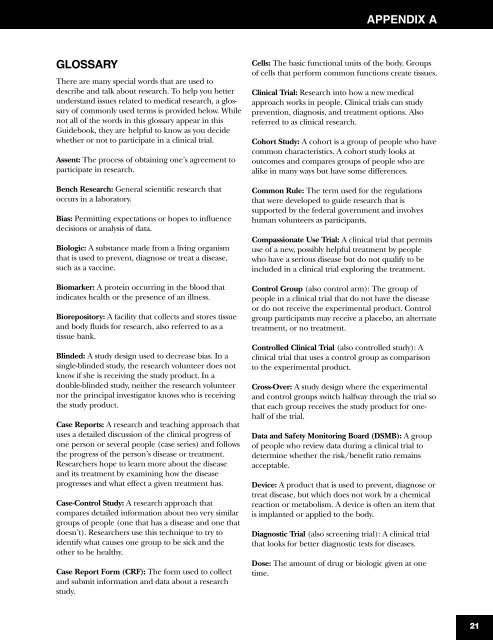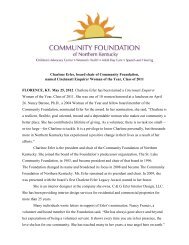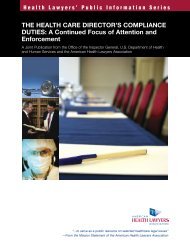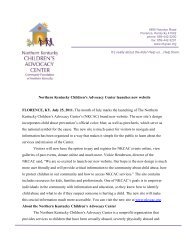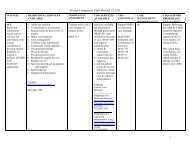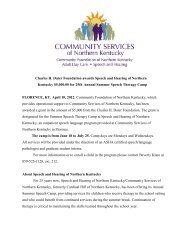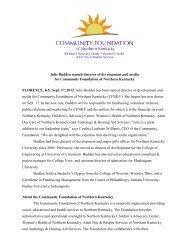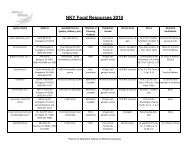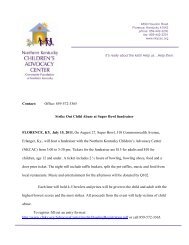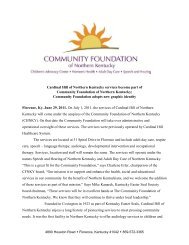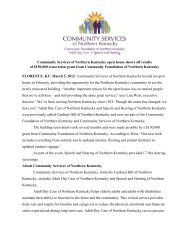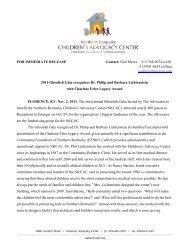Medical Research: A Consumer's Guide for Participation
Medical Research: A Consumer's Guide for Participation
Medical Research: A Consumer's Guide for Participation
Create successful ePaper yourself
Turn your PDF publications into a flip-book with our unique Google optimized e-Paper software.
APPENDIX A<br />
GLOSSARY<br />
There are many special words that are used to<br />
describe and talk about research. To help you better<br />
understand issues related to medical research, a glossary<br />
of commonly used terms is provided below. While<br />
not all of the words in this glossary appear in this<br />
<strong>Guide</strong>book, they are helpful to know as you decide<br />
whether or not to participate in a clinical trial.<br />
Assent: The process of obtaining one’s agreement to<br />
participate in research.<br />
Bench <strong>Research</strong>: General scientific research that<br />
occurs in a laboratory.<br />
Bias: Permitting expectations or hopes to influence<br />
decisions or analysis of data.<br />
Biologic: A substance made from a living organism<br />
that is used to prevent, diagnose or treat a disease,<br />
such as a vaccine.<br />
Biomarker: A protein occurring in the blood that<br />
indicates health or the presence of an illness.<br />
Biorepository: A facility that collects and stores tissue<br />
and body fluids <strong>for</strong> research, also referred to as a<br />
tissue bank.<br />
Blinded: A study design used to decrease bias. In a<br />
single-blinded study, the research volunteer does not<br />
know if she is receiving the study product. In a<br />
double-blinded study, neither the research volunteer<br />
nor the principal investigator knows who is receiving<br />
the study product.<br />
Case Reports: A research and teaching approach that<br />
uses a detailed discussion of the clinical progress of<br />
one person or several people (case series) and follows<br />
the progress of the person’s disease or treatment.<br />
<strong>Research</strong>ers hope to learn more about the disease<br />
and its treatment by examining how the disease<br />
progresses and what effect a given treatment has.<br />
Case-Control Study: A research approach that<br />
compares detailed in<strong>for</strong>mation about two very similar<br />
groups of people (one that has a disease and one that<br />
doesn’t). <strong>Research</strong>ers use this technique to try to<br />
identify what causes one group to be sick and the<br />
other to be healthy.<br />
Case Report Form (CRF): The <strong>for</strong>m used to collect<br />
and submit in<strong>for</strong>mation and data about a research<br />
study.<br />
Cells: The basic functional units of the body. Groups<br />
of cells that per<strong>for</strong>m common functions create tissues.<br />
Clinical Trial: <strong>Research</strong> into how a new medical<br />
approach works in people. Clinical trials can study<br />
prevention, diagnosis, and treatment options. Also<br />
referred to as clinical research.<br />
Cohort Study: A cohort is a group of people who have<br />
common characteristics. A cohort study looks at<br />
outcomes and compares groups of people who are<br />
alike in many ways but have some differences.<br />
Common Rule: The term used <strong>for</strong> the regulations<br />
that were developed to guide research that is<br />
supported by the federal government and involves<br />
human volunteers as participants.<br />
Compassionate Use Trial: A clinical trial that permits<br />
use of a new, possibly helpful treatment by people<br />
who have a serious disease but do not qualify to be<br />
included in a clinical trial exploring the treatment.<br />
Control Group (also control arm): The group of<br />
people in a clinical trial that do not have the disease<br />
or do not receive the experimental product. Control<br />
group participants may receive a placebo, an alternate<br />
treatment, or no treatment.<br />
Controlled Clinical Trial (also controlled study): A<br />
clinical trial that uses a control group as comparison<br />
to the experimental product.<br />
Cross-Over: A study design where the experimental<br />
and control groups switch halfway through the trial so<br />
that each group receives the study product <strong>for</strong> onehalf<br />
of the trial.<br />
Data and Safety Monitoring Board (DSMB): A group<br />
of people who review data during a clinical trial to<br />
determine whether the risk/benefit ratio remains<br />
acceptable.<br />
Device: A product that is used to prevent, diagnose or<br />
treat disease, but which does not work by a chemical<br />
reaction or metabolism. A device is often an item that<br />
is implanted or applied to the body.<br />
Diagnostic Trial (also screening trial): A clinical trial<br />
that looks <strong>for</strong> better diagnostic tests <strong>for</strong> diseases.<br />
Dose: The amount of drug or biologic given at one<br />
time.<br />
21


